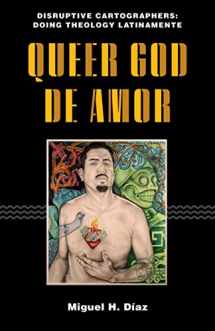
Queer God de Amor (Disruptive Cartographers: Doing Theology Latinamente)
Book details
Summary
Description
Review
Only Miguel Diaz could have written such a vivid and potent mixture of Catholic, Latinx, and LGBTQ theologies and experiences, seen through the lens of the mystical tradition of San Juan de la Cruz. Professor Diaz's new book will push at some boundaries and maybe even disturb a few people, but we must remember that is what the mystical tradition always does: invites us to see God in new ways and through surprising images, challenges us to imagine fresh paradigms, and encourages us to meet one another not as strangers but as friends and fellow believers.---James Martin, SJ, author, Learning to Pray and Building a Bridge
With this intensely scholarly and profoundly personal book Miguel Díaz has set a radical trajectory for a fresh grace-filled flowering of our understanding of God and the divine gift of sexuality, capable of consigning to history the damage inflicted by centuries of brutal legalism, sin, and shame. His fresh interpretations of the mystical and sensual writings of John of the Cross offer reassurance to those who believe in an omnisexual God who embraces all, is always and ever, the lover and beloved of all.---Mary McAleese, former President of Ireland, author, Quo Vadis? Collegiality in Canon Law
Miguel H. Dìaz entices us to venture into the landscape of Divine and human relationalities and desires. He does so through an examination of the life and work of San Juan de la Cruz. By queering faith, sexuality, and mysticism in de la Cruz’s work, this book spurs new conversations that actualize and (re)contextualize Christian traditioning in manifold ways. Thus, Dìaz takes spirituality to a new level by incarnating it into the daily-lived experiences of sexuality and desire---Hugo Córdova Quero, Associate Professor of Critical Theories and Queer Theologies, Starr King School for the Ministry
This creative and stimulating exploration of San Juan de la Cruz's ‘Living Flame of Love’ will help the reader re-imagine the possible intimacy of God, self, and sexuality. Building on San Juan’s awareness of erotic experience as a potential opening to the divine, Díaz highlights how queer, Latin@, and Catholic approaches to the mystery of sexual love might lead us into deeper relationship with our Queer God de Amor.---Brian Flanagan, President, College Theology Society
Queer God de Amor explores the mystery of God and the relationship between divine and human persons. It does so by turning to the sixteenth-century writings of John of the Cross on mystical union with God and the metaphor of sexual relationship that he uses to describe this union. Juan’s mystical theology, which highlights the notion of God as lover and God’s erotic-like relationship with human persons, provides a fitting source for rethinking the Christian doctrine of God, in John’s own words, as “un no sé qué,” “an I know not what.”
In critical conversations with contemporary queer theologies, it retrieves from John a preferential option for human sexuality as an experience in daily life that is rich with possibilities for re-sourcing and imagining the Christian doctrine of God. Consistent with other liberating perspectives, it outs God from heteronormative closets and restores human sexuality as a resource for theology. This outing of divine queerness―that is, the ineffability of divine life―helps to align reflections on the mystery of God with the faith experiences of queer Catholics. By engaging Juan de la Cruz through queer Latinx eyes, Miguel Díaz continues the objective of this series to disrupt the cartography of theology latinamente.


We would LOVE it if you could help us and other readers by reviewing the book
Book review



